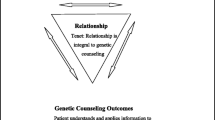Abstract
Genetic counselors are trained health care professionals who effectively integrate both psychosocial counseling and information-giving into their practice. Preparing genetic counseling students for clinical practice is a challenging task, particularly when helping them develop effective and active counseling skills. Resistance to incorporating these skills may stem from decreased confidence, fear of causing harm or a lack of clarity of psycho-social goals. The author reflects on the personal challenges experienced in teaching genetic counselling students to work with psychological and social complexity, and proposes a Genetic Counseling Adaptation Continuum model and methodology to guide students in the use of advanced counseling skills.

Similar content being viewed by others
References
Austin, J., Semaka, A., & Hadjipavlou, G. (2014). Conceptualizing genetic counseling as psychotherapy in the era of genomic medicine. Journal of Genetic Counseling, 23(6), 903–909.
Biesecker, B. B., Erby, L. H., Woolford, S., Adcock, J. Y., Cohen, J. S., Lamb, A., et al. (2013). Development and validation of the psychological adaptation scale (PAS): use in six studies of adaptation to a health condition or risk. Patient Education and Counseling, 93(2), 248–254.
Borders, L. D., Eubanks, S., & Callanan, N. (2006). Supervision of psychosocial skills in genetic counseling. Journal of Genetic Counseling, 15(4), 211–223.
Cambridge University Press (2011). Cambridge essential English dictionary (pp. xxi, 481 p., 416 p. of plates). Cambridge: Cambridge University Press.
Hartmann, J. E., Veach, P. M., MacFarlane, I. M., & LeRoy, B. S. (2015). Genetic counselor perceptions of genetic counseling session goals: a validation study of the reciprocal-engagement model. Journal of Genetic Counseling, 24(2), 225–237.
Kessler, S. (1997). Psychological aAspects of gGenetic cCounseling. IX. Teaching and Counseling. Journal of Genetic Counseling, 6(3), 287–295.
Lochner, L., Wieser, H., & Mischo-Kelling, M. (2012). A qualitative study of the intrinsic motivation of physicians and other health professionals to teach. International Journal of Medical Education, 3, 209–215.
Meiser, B., Irle, J., Lobb, E., & Barlow-Stewart, K. (2008). Assessment of the content and process of genetic counseling: a critical review of empirical studies. Journal of Genetic Counseling, 17(5), 434–451.
Paul, J., Metcalfe, S., Stirling, L., Wilson, B., & Hodgson, J. (2015). Analyzing communication in genetic consultations--a systematic review. Patient Education and Counseling, 98(1), 15–33.
Peek, C. J., Baird, M. A., & Coleman, E. (2009). Primary care for patient complexity, not only disease. Families, Systems & Health, 27(4), 287–302.
Redlinger-Grosse, K., Veach, P. M., Cohen, S., LeRoy, B. S., MacFarlane, I. M., & Zierhut, H. (2016). Defining our clinical practice: the identification of genetic counseling outcomes utilizing the reciprocal engagement model. Journal of Genetic Counseling, 25(2), 239–257.
Resta, R. G. (2006). Defining and redefining the scope and goals of genetic counseling. American Journal of Medical Genetics. Part C, Seminars in Medical Genetics, 142C(4), 269–275.
Resta, R., Biesecker, B. B., Bennett, R. L., Blum, S., Hahn, S. E., Strecker, M. N., et al. (2006). A new definition of genetic counseling: National Society of genetic Counselors' task force report. Journal of Genetic Counseling, 15(2), 77–83.
Veach, P. M., LeRoy, B., & Bartels, D. M. (2003). Facilitating the genetic counseling process a practice manual (pp. xii, 308 p.). New York: Springer.
Veach, P. M., Bartels, D. M., & Leroy, B. S. (2007). Coming full circle: a reciprocal-engagement model of genetic counseling practice. Journal of Genetic Counseling, 16(6), 713–728.
Weil, J. (2003). Psychosocial genetic counseling in the post-nondirective era: a point of view. Journal of Genetic Counseling, 12(3), 199–211.
Wenrich, M. D., Jackson, M. B., Ajam, K. S., Wolfhagen, I. H., Ramsey, P. G., & Scherpbier, A. J. (2011). Teachers as learners: the effect of bedside teaching on the clinical skills of clinician-teachers. Academic Medicine, 86(7), 846–852.
Author information
Authors and Affiliations
Corresponding author
Ethics declarations
This is not a research study and therefore does not meet the criteria for research ethics review.
Conflict of Interest
Andrea Shugar declares that she has no conflict of interest.
Human Studies and Informed Consent
Andrea Shugar declares that she has no conflict of interest.
Animal Studies
No animal studies were carried out by the author for this article.
Rights and permissions
About this article
Cite this article
Shugar, A. Teaching Genetic Counseling Skills: Incorporating a Genetic Counseling Adaptation Continuum Model to Address Psychosocial Complexity. J Genet Counsel 26, 215–223 (2017). https://doi.org/10.1007/s10897-016-0042-y
Received:
Accepted:
Published:
Issue Date:
DOI: https://doi.org/10.1007/s10897-016-0042-y




